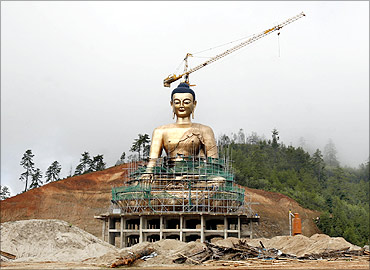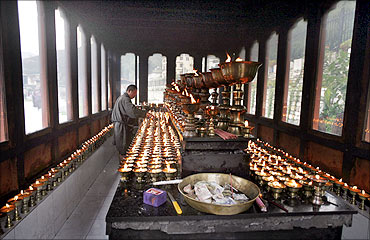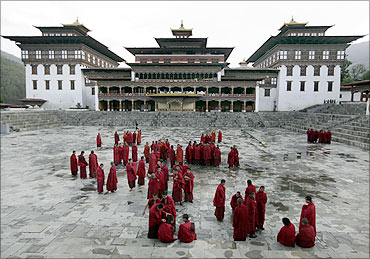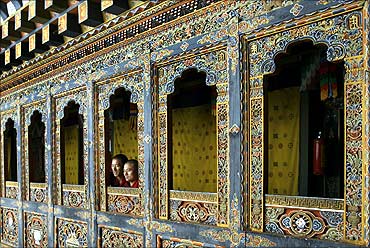Photographs: Singye Wangchuk/Reuters Arijit Barman in Mumbai
Everybody needs good neighbours. And one doesn't need US President Barack Obama to tell us that.
In yet another instance of proactive economic diplomacy with Bhutan, a consortium of Indian banks led by the country's biggest lender State Bank of India has come forward to take the lead role to finance efforts of industrialisation in the mountain kingdom.
The SBI-led consortium recently helped in financing Bhutan's largest cement plant, the second in the country, with an annual capacity of 1.34 million tonnes (mt).
It will also be the first instance of the Reserve Bank of India allowing rupee financing for an overseas project.
. . .
India 'cements' Bhutan's gross national happiness
Image: An under-constructed statue of Buddha is pictured at Kuensel Phodrang in Thimphu.Photographs: Singye Wangchuk/Reuters
Bhutan, known more for its gross national happiness than for its national production, is trying hard to diversify its industrial output, currently dominated by sale of hydel power, agriculture, forestry, tourism and handicrafts.
Despite being one of the smallest economies of the world, Bhutan is also one of the fastest growing.
The focus, therefore, has been exploring ways to set up manufacturing bases for local demand and exports.
. . .
India 'cements' Bhutan's gross national happiness
Image: A Bhutanese man lights butter lamps inside a temple in Thimphu.Photographs: Singye Wangchuk/Reuters
The project is scheduled to be implemented over a period of 27 months and is expected to begin commercial production from January 2012.
The cement plant, like most industrial projects of Bhutan, is housed under a special purpose vehicle floated by Druk Holding and Investments Ltd, the investment arm of the royal government.
The SPV is called Dungsam Cement Corporation. Both the equity and the debt have been organised by the Indian side. The total project cost is Rs 717 crore (Rs 7.17 billion).
The Ministry of External Affairs gave a Rs 300-crore (Rs 3-billion) grant to its Bhutanese counterpart, which, in turn, used it as equity.
For the debt syndication of Rs 410 crore (Rs 4.1 billion), SBI Capital was given the mandate to organise financing from a consortium of four Indian and five Bhutanese lenders.
. . .
India 'cements' Bhutan's gross national happiness
Image: Buddhist monks stand inside the complex of Tashichhodzong in Bhutan's capital Thimphu.Photographs: Rupak De Chowdhuri/Reuters
The project, conceived in 1982, was originally meant to be a half-a-million-tonne capacity.
But till 2007, the project never really took off, despite several technical and economical feasibility studies.
But growing demand in Bhutan and north-eastern states of India revived the project.
The basic raw materials required -- limestone, gypsum, phyllite and slag -- will come from the neighbouring mines, while the fly ash requirement will be met by NTPC's thermal plants in Assam and West Bengal.
Part of the output will, therefore, also get exported to Assam, Meghalaya, Nagaland, Sikkim and north Bengal.
. . .
India 'cements' Bhutan's gross national happiness
Image: Monks look out of a temple in Tango monastery on the outskirts of Thimphu.Photographs: Singye Wangchuk/Reuters
For that additional Rs 100 crore (Rs 1 billion) will be pumped in by the Indian government to develop the supporting road and rail-road infrastructure for the plant on the Indian side of the Indo-Bhutanese border.
"In the past, there have been bilateral deals between the two governments in the hydel power sector, but this is the first time a commercial loan based on commercial terms have been arranged from an Indian consortium of lenders.
"This would help us to also explore several other opportunities for industry in future from the Indian capital markets," Druk Holding and Investments CEO Karma Yonten told Business Standard from Thimpu.
Both sides see the economic engagement predominantly focusing on buying and selling of hydel power generation, but as private sector companies in ferro alloys and other manufacturing sectors set up base in Bhutan, the engagement is expected to grow exponentially.







article